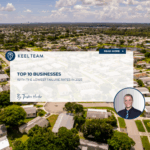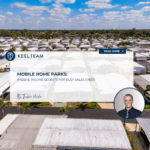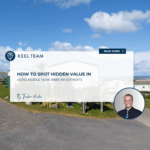10 Ways to Potentially Mitigate Risk in Mobile Home Park Investments
Investing in mobile home parks presents unique opportunities and challenges. While the potential for steady income and long-term growth is promising, prudent investors know the importance of mitigating risks. Here are ten strategies to help reduce risk in mobile home park investments.

1. Conduct Thorough Due Diligence
Performing comprehensive due diligence is fundamental to possibly reducing risk. This means carefully examining factors like local market conditions, property status, and growth potential. A detailed understanding of these aspects can help you make informed decisions and identify potential issues before they become significant.
2. Build a Strong Professional Network
Creating a robust network within the real estate and mobile home park community can be invaluable. Engaging with industry experts, attending conferences, and participating in online forums can provide access to valuable insights and best practices. Networking can also lead to partnerships and collaborations that help navigate challenges.
3. Stay Updated on Legal Compliance
Understanding and complying with local and federal regulations is crucial. Familiarize yourself with zoning laws, tenant rights, and other regulatory requirements. Staying updated on legislative changes and maintaining strict compliance can help prevent legal issues.
4. Diversify Your Mobile Home Park Investments
Diversifying your mobile home park investments can help spread and reduce risk. Rather than putting all your funds into one property, consider investing in multiple properties in different locations or with varying characteristics. Diversification can potentially minimize the impact of specific market challenges and provide a safety net against unforeseen circumstances.
5. Monitor Economic Trends
Keeping an eye on economic trends is often essential for risk mitigation. Economic downturns can affect the financial stability of both investors and tenants. Staying informed about economic indicators allows you to likely adjust your strategies, such as modifying rental rates or offering incentives, to better weather economic challenges.
Download our FREE eBook on the “Top 20 Things I’ve Learned from Investing in Mobile Home Parks “
By Andrew Keel

6. Secure Long-Term Lease Agreements in Your Mobile Home Park Investments
Long-term lease agreements with tenants can contribute to stable cash flow. Converting park-owned homes to tenant-owned homes through sales or rent-to-own arrangements can also increase tenant retention. Long-term leases often provide a predictable income stream and potentially reduce the risk associated with frequent turnover.
7. Maintain Financial Resilience
Having financial resilience is likely crucial for risk mitigation. Maintaining a financial buffer to handle unforeseen expenses, market fluctuations, or economic downturns can provide a safety net. Proper financial planning, including setting aside reserves for maintenance and unexpected costs, helps enhance overall investment stability.
8. Ensure Excellent Property Management in Your Mobile Home Park Investments
Efficient property management is vital for risk reduction. Keeping the mobile home park well-maintained, promptly addressing tenant concerns, and implementing effective operational processes can help boost tenant satisfaction and encourage long-term stability. Well-managed properties are less likely to face issues that could threaten the investment.
9. Invest in Comprehensive Insurance
Comprehensive insurance coverage is a proactive risk mitigation measure. Insurance policies tailored to mobile home park investments can help protect against various risks, including property damage, liability claims, and unforeseen events. Regularly reviewing and updating insurance coverage contributes to adequate protection.
10. Adapt to Market Changes
Flexibility in adapting to market trends is essential. Understanding evolving tenant needs and preferences possibly allows you to adjust strategies accordingly. Whether it’s introducing new amenities, upgrading facilities, or aligning with sustainable living trends, adaptability typically contributes to long-term success and risk mitigation.
Conclusion to Potentially Mitigating Risk in Mobile Home Park Investments
Mitigating risks in mobile home park investments usually requires a strategic, multifaceted approach. By combining the above-mentioned tips, investors can potentially develop a robust risk mitigation strategy. Implementing these strategies can help safeguard your investment and lay the foundation for potentially long-term stability and profitability. As the landscape of mobile home park investments evolves, embracing these approaches can help you navigate challenges and possibly build a resilient, rewarding portfolio.
Ready to explore passive mobile home park investments? Connect with us today to discover how you can potentially enhance community value and achieve impressive returns. Learn more about our strategic investment approach as well as the ins and outs of this asset class! Contact us using the form below.
Learn more about mobile home park investing.
Interested in learning more about mobile home park investing? Get in touch with us today to find out more.
Disclaimer:
The information provided is for informational purposes only and should not be considered investment advice, nor a guarantee of any kind. There are no guarantees of profitability, and all investment decisions should be made based on individual research and consultation with registered financial and legal professionals. We are not registered financial or legal professionals and do not provide personalized investment recommendations.
View The Previous or Next Post
Subscribe Below 👇





